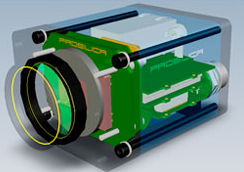Dec 22 2008
SCHOTT KL 200 LED and EasyLED Ringlight Plus bring Cold Light to Bear in Stereo Microscopy, Macroscopy and Photography Units Feature Ergonomic Controls and Low Noise. SCHOTT’s Fiber Optics Division released the NEW KL 200 LED Series cold light engine and the EasyLED Ringlight Plus stereo microscopy lamp.

These low energy consuming lighting solutions are designed to bring high-performance illumination to industrial, biological lab, and home applications. Both products come with integrated controllers and can be mounted directly to the microscope. This saves space on the workbench and allows for ergonomic operation, because all levers needed are part of the microscope stand. There is no need to remove eyes from eyepieces while working.
The KL 200 LED is a fiber optic cold light source that contains an LED light engine that is actually brighter than a 20 watt halogen bulb, while using 80 percent less energy (5 W vs. 25 W). Because there is no need to change bulbs on the KL 200 LED, the costs of replacing or servicing bulbs is also eliminated. The LED light engine offers a brighter, neutral 5300 K white light; continuous dimming (0-100) and a separate on/off switch. This allows users to maintain light level settings over multiple sessions.
The compact housing easily adapts to multitudes of microscope stands. Convection cooling makes the KL 200 LED a compact and versatile unit that is free of noise and vibration. KL 200 LED is designed for ease of use and conform to CSA (United States) and the CE standards. It comes with a universal power supply (120 - 240-volt) so it can be used worldwide.
“The SCHOTT KL 200 LED offers customers both superior performance and long operational life, at a most attractive price,” said Carl VanDommelen, sales manager, SCHOTT Fiber Optics. “The long lasting LED lights, combined with the carefully designed ergonomic controls assure a long operational life in labs and other research facilities worldwide.”
The EasyLED Ringlight Plus contains 48 high brightness neutral white (5,600 K) LEDs and features an innovative “jog dial” wheel for convenient and intuitive operation. The ring-lights can be directly attached to lenses and operate over a wide range of working distances (from 50 to 130 mm). Segment-able ring-lights can emulate various fiber optic geometries like continuous ring, double gooseneck or linelights.
Images produced by the EasyLED Ringlight Plus possess excellent color fidelity and are well-suited for use with digital cameras. All units offer a universal power supply (100-240 V) and use direct current to make the EasyLED Ringlight Plus absolutely flicker-free. Separate dimming and on/off switches keep light level settings consistent use after use. Fan-less design makes the EasyLED Ringlight Plus quiet, vibration-free, and suitable for both clean room and rougher laboratory or industrial environments.
The product has a lifetime of 30,000 hours, saving both energy as well as the cost of replacing halogen bulbs. A suite of accessories, including adaptors, polarizers, protection glasses and diffusers, make EasyLED Ringlight Plus suitable for any stereo microscope. “The EasyLED Ringlight Plus is a flexible high-precision tool, combining both excellent performance and attractive pricing,” said VanDommelen. “The innovative ‘Jog Dial’ wheel and compact low-power consumption based technology, makes the EasyLED Ringlight Plus the new standard in microscopy illumination.”